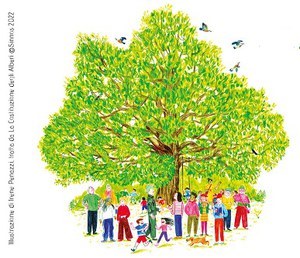The phenomenon of Plant Blindness is often discussed, referring to the evolutionary trait where humans do not "see" plants in a given environment, do not notice them, take them for granted, while instinctively prioritizing the recognition of animals that may constitute crucial resources or threats to their survival. In light of this, plants are fundamental organisms in our lives: they provide us with oxygen, food, medicines, materials, they gift us well-being with their beauty, and they play a crucial role as climate regulators, thanks to their ability to capture and transform the carbon dioxide present in the atmosphere.
Today, taking an interdisciplinary look at plants presents a true and fascinating opportunity, revolutionary in its essence, to rethink our lives on the planet and our future. You can begin by getting to know plants, recognizing them, and engaging with them through practices and the revival of sedimented skills, such as guided botanical walks in the green spaces of the city. Educational explorations and botanical excursions, both iconographic and literary, can be undertaken through the botanical collection of herbariums, essays, and illustrated books, named Scaffale botanico(Botanical Shelf)," comprising over sixty titles. This section is available at the Library of the Rimini Campus. Among the volumes in this selection (curated in collaboration with the Giannino Stoppani Bookstore in Bologna) is also a recent book by Stefano Mancuso illustrated by Philip Giordano for Aboca, as well as the elementary botanical atlases by Jean Jacques Rousseau, and "Arboretum”.
The great book of trees, the enchanting "Nel mio giardino" by Jolivot. Alongside the excellences of contemporary children's publishing, there is the great narrative non-fiction such as "La foresta nascosta" by David George Haskell, and of course, the writings of Rachel Carson, founder of the environmental movement and extraordinary writer. Un tempo botanico: esperienze di benessere(A Botanical Time: Experiences of Well-being) is the project curated by a group of professors and researchers from the Department of Sciences for Quality of Life: Fabiana Antognoni, Raffaella Casadei, Valeria Righi, Marcella Terrusi, Andrea Ceciliani, Laura Bragonzoni, and Pasqualino Maietta are the individuals who bring together perspectives from vastly different disciplines such as Biology, Botany, Biochemistry, Sports Sciences, Pedagogy, and the study of Children's Literature. They unite around the concept of a quality-focused time, crucial for actively and responsibly living on our planet (a planet largely inhabited by plant organisms). "A Botanical Time: Experiences of Well-being" consists of a program of initiatives and events for public engagement aimed at children, students, teachers, and the general audience.
It includes workshops and seminars integrating movement and outdoor explorations, as well as conversations with authors such as Sara Colaone, who adapted Italo Calvino's arboreal classic "Il Barone Rampante" into a comic book format. The events include readings by actors Alessia Canducci and Alfonso Cuccurullo, held at the Cineteca Hall of the Gambalunga Library in Rimini, along with several other events scheduled throughout the spring of 2024.


